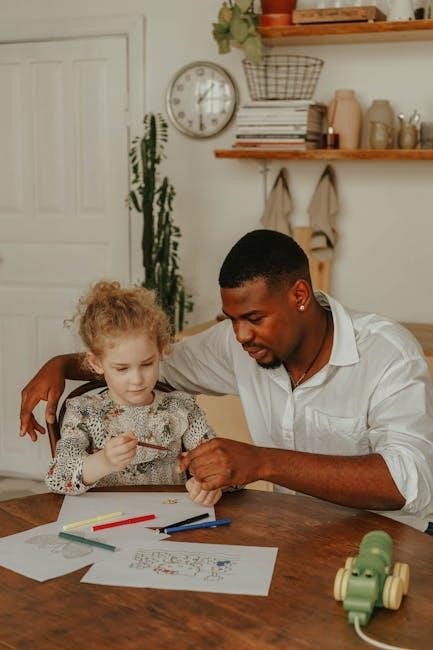DBT (Dialectical Behavior Therapy) skills are practical strategies to manage emotions, behaviors, and relationships․ These skills, including PLEASE, help individuals develop emotional resilience and improve overall well-being through structured techniques and exercises․
1․1․ Importance of DBT Skills in Therapy
DBT skills play a crucial role in addressing emotional and behavioral challenges by providing practical tools for managing overwhelming emotions and improving relationships․ These skills are structured to help individuals develop self-awareness, emotional resilience, and effective communication strategies․ The PLEASE skills, for instance, focus on physical and mental well-being, emphasizing the importance of balancing eating habits and treating physical illnesses․ By incorporating these techniques, clients can reduce harmful behaviors and improve their quality of life․ DBT skills are essential because they offer a comprehensive approach to managing emotions, making them a cornerstone of therapy for individuals struggling with intense emotional dysregulation․ The skills are designed to be learned and practiced, providing long-term benefits and empowering individuals to handle life’s challenges more effectively․ This structured approach ensures that clients gain the tools necessary for lasting change and personal growth;

Core Mindfulness Skills
Core mindfulness skills teach individuals to stay present and aware, enabling them to observe emotions without judgment․ These skills enhance the effectiveness of PLEASE skills by fostering emotional balance and well-being․
2․1․ Key Techniques for Practicing Mindfulness
Mindfulness is cultivated through techniques like observation, description, and participation․ These practices help individuals focus on the present moment without judgment, enhancing emotional regulation and reducing impulsivity․ Regular mindfulness exercises improve self-awareness and emotional balance, making it easier to manage stress and anxiety effectively․ By staying grounded, individuals can respond to situations more thoughtfully rather than react impulsively․ These techniques are foundational for mastering other DBT skills, including PLEASE, and promote overall mental well-being․ Consistent practice strengthens the ability to remain calm and focused, even in challenging situations, fostering a more balanced and resilient emotional state․

Distress Tolerance and Emotional Regulation Skills
These skills help individuals manage emotional crises and reduce intensity․ Techniques like PLEASE Skills promote well-being by addressing physical and emotional needs, ensuring a balanced approach to handling distress effectively every day․
3․1․ Understanding the PLEASE Skills
The PLEASE Skills are a core component of Dialectical Behavior Therapy (DBT), designed to help individuals manage emotional distress by addressing basic physical and emotional needs․ Each letter in the acronym represents a specific strategy:
– Treat Physical Illness: Addressing physical health issues that may contribute to emotional instability․
– Balance Eating: Maintaining a healthy diet to stabilize mood and energy levels․
– Avoid Mood-Altering Substances: Reducing the use of substances that can exacerbate emotional vulnerability․
– Sleep: Ensuring adequate rest to regulate emotions and reduce irritability․
– Exercise: Engaging in physical activity to improve mood and reduce stress․
By practicing these skills, individuals can reduce emotional vulnerability and create a foundation for better emotional regulation․ The PLEASE Skills emphasize the importance of self-care in managing distress and improving overall well-being․ Regular practice helps individuals develop healthy habits that support long-term emotional stability․
3․2․ Effective Strategies for Emotional Regulation
Emotional regulation is a key component of DBT, focusing on managing intense emotions to prevent harmful behaviors․ One effective strategy is the RESISTT technique, which helps individuals respond to emotional triggers constructively․ The acronym stands for:

– Rate the intensity of your emotions․
– Escribe your feelings without judgment․
– Stones of voice matter—speak calmly․
– Identify your beliefs about the situation․
– Suggest alternative perspectives․
– Take action based on values, not emotions․
– Tolerate the moment without reacting impulsively․
Another strategy is practicing Wise Mind, which combines rational thinking with emotional awareness to make balanced decisions․ Additionally, using diary cards to track emotions and skills used helps identify patterns and improvement areas․ Regular practice of these strategies enhances emotional resilience and reduces crisis incidents․ By mastering these techniques, individuals can better navigate challenging emotional situations and achieve stability․
Interpersonal Effectiveness Skills

Interpersonal effectiveness skills help individuals communicate assertively while maintaining relationships․ Techniques like DEAR MAN teach how to express needs clearly and respectfully․ These skills balance assertiveness with empathy to achieve personal goals while preserving connections․
4․1․ Mastering the DEAR MAN Technique
The DEAR MAN technique is a cornerstone of DBT’s interpersonal effectiveness skills․ It stands for: Describe the situation, Express your feelings, Assert your needs, Reinforce with consequences, Mindful listening, Approach with a compromise, and Negotiate the outcome․ This structured approach helps individuals communicate effectively while maintaining respect and boundaries․ By practicing DEAR MAN, one can express desires clearly, listen actively, and seek mutually beneficial solutions․ It’s particularly useful in challenging conversations, ensuring that both parties feel heard and valued․ Regular use of this technique enhances assertiveness and relationship satisfaction, making it a vital tool for personal and professional interactions․ Incorporating DEAR MAN into daily communication fosters healthier connections and reduces conflict․
Implementing DBT Skills in Daily Life
Practicing DBT skills daily enhances emotional resilience and overall well-being․ Techniques like the PLEASE skills focus on physical health, balancing eating, and avoiding substances that alter mood, fostering a stable lifestyle․
5․1․ The Role of Diary Cards in Tracking Progress
Diary cards are essential tools in DBT for monitoring emotions, behaviors, and skill usage․ They help individuals track patterns and progress, ensuring consistent practice of skills like PLEASE and mindfulness․ Regular use enhances self-awareness and accountability, making therapy more effective․
Mastering DBT skills, including PLEASE, empower individuals to manage emotions and behaviors effectively․ Regular practice and tracking progress with diary cards foster resilience, leading to a more balanced and fulfilling life․
